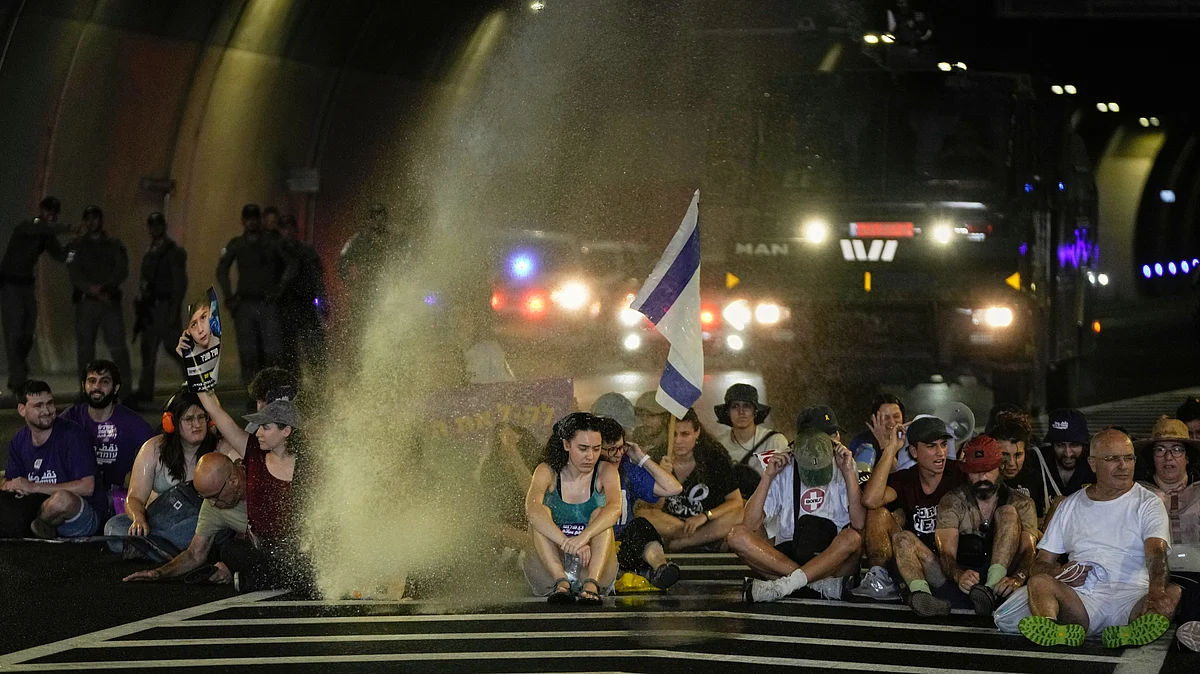World
Israel: Protesters go on strike over ceasefire, release of Gaza hostages
The 'day of stoppage' was organised by associations representing hostage families and bereaved relatives

Protesters across Israel intensified their campaign on Sunday, staging a nationwide strike to pressure the government into striking a deal for the release of hostages still held by militants in Gaza. Traffic ground to a halt, businesses shuttered, and rallies erupted in dozens of locations as frustration mounted over the government’s strategy.
The 'day of stoppage', organised by associations representing hostage families and bereaved relatives, followed weeks of growing anguish after militant groups released hostage videos and Israel signalled fresh military operations. Demonstrators, fearing that further escalation could seal the fate of the 50 hostages believed to remain in Gaza — only around 20 thought to be alive — chanted: “We don't win a war over the bodies of hostages.”
At protest points across the country, including outside politicians’ homes, outside army headquarters and along major highways, demonstrators blocked lanes and lit bonfires, with police deploying water cannons to disperse crowds. Some restaurants and theatres closed in solidarity, and by evening, police reported 32 arrests. The demonstrations have been described as the largest wave of dissent since the outrage in September 2024, when six hostages were discovered dead in Gaza.
“Military pressure doesn't bring hostages back — it only kills them,” said former hostage Arbel Yehoud, addressing a crowd at Tel Aviv’s Hostage Square. “The only way to bring them back is through a deal, all at once, without games.”
For families, the message was one of unity and urgency. “Today, we stop everything to save and bring back the hostages and soldiers. Today, we stop everything to remember the supreme value of the sanctity of life,” said Anat Angrest, mother of hostage Matan Angrest. “Today, we stop everything to join hands — right, left, centre and everything in between.”
Published: undefined
Although Israel’s biggest labour union, Histadrut, declined to formally join the action, the strike was still highly unusual in scope. Municipalities and private businesses independently halted work, underscoring the broad resonance of the hostage crisis.
Yet, even amid the protests, political realities complicate any resolution. Prime Minister Benjamin Netanyahu insists on the immediate return of all hostages, but his coalition is riven by far-right partners who reject any deal that leaves Hamas in control of Gaza. The last ceasefire-hostage swap nearly toppled his government, and ministers have threatened to walk out if he pursues similar arrangements again.
Finance minister Bezalel Smotrich dismissed the strike as “a bad and harmful campaign that plays into Hamas' hands, buries the hostages in the tunnels and attempts to get Israel to surrender to its enemies and jeopardise its security and future”. National security minister Itamar Ben-Gvir accused protesters of seeking to “weaken Israel”, insisting the action “strengthens Hamas and delays the return of the hostages”.
Israeli strikes expand to Yemen
Even as protests raged, Israel widened its regional front. On Sunday, the Israeli military said it struck energy infrastructure in Yemen, targeting Iran-backed Houthi forces who have repeatedly launched missiles toward Israel and attacked Red Sea shipping lanes.
Al-Masirah TV, run by the Houthis, said a power plant in Sanhan district near Sanaa was hit, sparking a blaze and knocking it out of service. Israel claimed the facilities were being used to support attacks against it.
Though some missiles from Yemen have penetrated Israeli defences — particularly during the 12-day conflict with Iran in June — the IDF says it has intercepted most projectiles.
Published: undefined
Preparations for Gaza offensive continue
Meanwhile, Israel’s military is preparing for a renewed push into Gaza City and other densely populated areas, aiming to crush Hamas’ remaining strongholds. On Sunday, COGAT, the defence body overseeing humanitarian aid, announced that shipments of tents and shelters would resume, ostensibly to facilitate the evacuation of civilians from battle zones.
Israel has tightly restricted aid flows since reimposing a full blockade in March, after the collapse of a ceasefire. Deliveries have since trickled back, but humanitarian agencies warn they fall drastically short of needs. Critics accuse Israel of “weaponising aid” by controlling access in line with military objectives.
The war has already devastated Gaza. According to the Hamas-run health ministry, 61,897 people have been killed, about half of them women and children. On Sunday alone, officials reported that seven children had died from malnutrition-related causes, including two infants. The UN describes the ministry’s data as the most reliable available, though Israel disputes the figures and provides no alternative count.
The conflict traces back to a surprise Hamas assault on 7 October 2023, which killed around 1,200 people in Israel and triggered Israel’s unrelenting retaliatory campaign. Nearly the entire Gazan population has since been displaced, with the UN warning of record levels of hunger and malnutrition.
Against this backdrop, the families of Israeli hostages argue that the government’s uncompromising military approach not only prolongs suffering in Gaza but also imperils their loved ones’ lives. Their nationwide strike on Sunday was both a cry of anguish and a test of Netanyahu’s political calculus — whether to risk his coalition’s collapse for a deal, or press ahead with a war that hostage families fear could claim the very lives they are fighting to save.
With AP/PTI inputs
Published: undefined
Follow us on: Facebook, Twitter, Google News, Instagram
Join our official telegram channel (@nationalherald) and stay updated with the latest headlines
Published: undefined